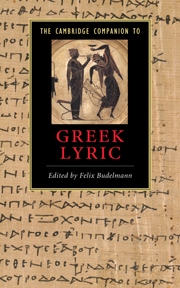Book contents
- Frontmatter
- Introducing Greek lyric
- Part I: Contexts and topics
- Part II: Poets and traditions
- 8 Iambos
- 9 Elegy: Forms, functions and communication
- 10 Alcman, Stesichorus and Ibycus
- 11 Alcaeus and Sappho
- 12 Anacreon and the Anacreontea
- 13 Simonides, Pindar and Bacchylides
- 14 Ancient Greek popular song
- 15 Timotheus the New Musician
- Part III: Reception
- Chronology of select melic, elegiac and iambic poets
- Further Reading
- Glossary
- List of works cited
- Index
12 - Anacreon and the Anacreontea
from Part II: - Poets and traditions
Published online by Cambridge University Press: 28 May 2010
- Frontmatter
- Introducing Greek lyric
- Part I: Contexts and topics
- Part II: Poets and traditions
- 8 Iambos
- 9 Elegy: Forms, functions and communication
- 10 Alcman, Stesichorus and Ibycus
- 11 Alcaeus and Sappho
- 12 Anacreon and the Anacreontea
- 13 Simonides, Pindar and Bacchylides
- 14 Ancient Greek popular song
- 15 Timotheus the New Musician
- Part III: Reception
- Chronology of select melic, elegiac and iambic poets
- Further Reading
- Glossary
- List of works cited
- Index
Summary
Along with Sappho and Pindar, Anacreon is probably the Greek lyric poet with the most extensive reception history. His cultural influence has been such that many European languages have a word like 'anacreontic'. At the core of the 'anacreontic' is a simple pair: drink and desire, or 'convivial, amatory', as the Oxford English Dictionary defines the word. This image of Anacreon is dominant already in antiquity. In the second century BCE Antipater ends his imaginary epitaph for him (Anth. Pal. 7.27): 'For all your life, old man, was poured out as an offering to these three - the Muses, Dionysus and Eros.' Athenaeus (first/second century CE) has Democritus of Nicomedia say that Anacreon made all poetry 'hang on drunkenness' (429b), and Cicero claims it is all amatoria (Tusc. 4.71). There is of course plenty of variation. Anacreon can be a moderate or a debauched drinker, and can therefore spark moral, political and religious debates. Moreover, his reputation has further facets; he is often old for instance, and he can be wise, acting even as an advisor to rulers. But the dominant associations are stable: Anacreon is a poet of drink and desire. This traditional image, and the question of how good a guide it is to Anacreon's own output, will run through the chapter. The discussion will begin with Anacreon's contexts and his poetry and then move on to secondary performances and ancient reception, in particular the collection of poems known as the Anacreontea.
- Type
- Chapter
- Information
- The Cambridge Companion to Greek Lyric , pp. 227 - 239Publisher: Cambridge University PressPrint publication year: 2009
- 5
- Cited by

